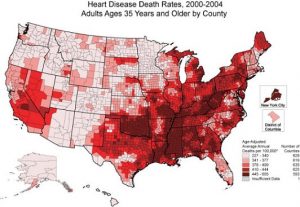Health geography
For several lectures, we discussed various topics within the realm of “health geography”. The following is a brief summary and some highlights from the lectures that I found particularly interesting.
Health geography is more than just “medical” geography. Traditional “medical geography” examines where people are dying, while “health geography” examines how to improve people’s lives while they are still living. Health geographers often tend to be rooted in social theory, and thus incorporate socioeconomic factors into their analysis of health in place (as opposed to space), meaning they have more ‘open-minded’ approaches than some traditional medical geographers. According to Jamie Baxter, health geography involves topics such as disease ecology, health care delivery, and health as it relates to one’s environment.

Examining health from a geographical perspective is extremely beneficial, since health (or ill-health) is often inherently linked to life-style and environmental factors (Scholten & Lepper, 1991). GIS can be used to examine and understand these links, thorough studies of spatial epidemiology, environmental hazards, models of health services, and identification of health inequalities. Of these different applications for GIS in health geography, I found the modelling of the spatial distribution of health services especially interesting.

Using GIS-based approaches can allow for the identification of patterns of health / ill-health, and thus inform health care providers in their allocation of their services. This can be used to create a more efficient system, which thus has the power to both save more lives and money. The distance that one lives from a health care provider can dramatically impact the survival rate for many ailments, and many small / rural / low-income communities often are not situated close enough to these essential services. I find this issue especially concerning, since these communities are also often faced with other troubling socioeconomic difficulties.

We also had a lecture that covered the concept of the “participatory bio-citizen“. This is referring to all the personal health data that everyday citizens are constantly collecting, through their digital devices like Fitbits and Apple watches. It poses an interesting duality; this data can be extremely detailed and extensive, however there are also a number of issues related to the ethics and quality of this data collection. I personally found this lecture fascinating, as well as somewhat concerning, since I track some of my personal health data on various different online apps and devices. It’s kind of concerning to me that this personal information can be used in so many different contexts (like by Facebook to target advertisements), but at the same time the potential of it in medical research is also astounding.